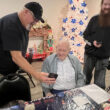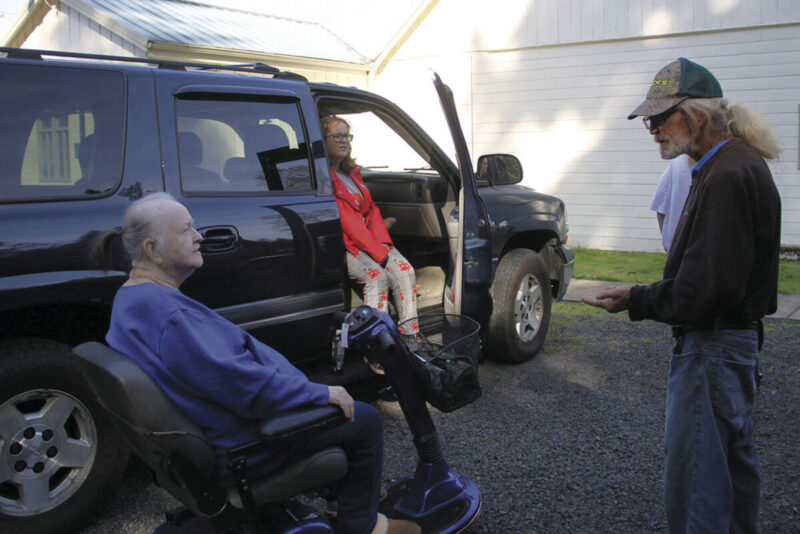Kelly Kenoyer
On a bright Saturday morning in mid-October, Louis Carreiro anxiously waited for a car he wouldn’t recognize, peeking out of his tent at every sound.
He had hardly slept that night, nervous and excited in equal measure for the arrival.
Carreiro hadn’t seen his mother, or any of his family for that matter, in more than 20 years, but she was coming for a visit that day.
He’d been on the streets since the late 1990s, when methamphetamine addiction and stints in jail left him on the streets of Medford, his hometown. It took more than a decade for him to kick that addiction, and by then he had decided he wasn’t worth his family’s time.
“I got into drugs when I was 18, got a felony possession charge,” he said. “Life just went downhill from there.”
He was stuck in the system, cursed by addiction and imprisoned due to probation violations and possession charges, along with a 1992 assault charge he said came from fighting a man who had slapped a woman.
He got jobs in kitchens, then lost them when he’d get sentenced to time in prison, over and over for two decades. Eventually, he got sick of it and quit meth for good.
“I quit doing it in ’97. I haven’t touched it. Don’t want it, don’t need it, don’t want to be around people who do it,” he said, casting a wary eye over the other tents set up around the Church of Nazarene, which has allowed homeless people to camp on its property. “They’ll steal from their grandma to get that stuff. It’s not right.”
Carreiro, 56, sets himself away and apart from the other homeless at the camp, alone but for the company of his two dogs most of the time.
He keeps them close, the puppy sleeping on his chest to stay warm each night.
“I’ve actually had a very interesting life. I’ve had a hard life, and the only person I can blame it on is me. I’m the one who made the stupid decision to do dope,” he said. “Right now, I’m just trying to pick the pieces back up and start life again.”
Carreiro spent a few years in Arizona in the early 2000s, but when he came back to Oregon he decided against returning to Medford. He didn’t want to bother his family, convinced they wouldn’t want him. But he’s stayed out of trouble since his return, he said.
He started working with homeless advocates to get some stability in his life, and when his dog became pregnant he got featured in The New Era for his determination to take care of her. Little did he know, the article would help his family find him again.
His sister, Tina Williams, has punched his name into Google every so often to see if she could find him. It took years, but finally his name cropped up, alongside photos of him with a dozen puppies.
The family called Pastor Bethanie Young at the Church of Nazarene, and Carreiro heard his mother’s voice for the first time in 20 years.
“We both cried on the phone,” he admitted.
When the family finally arrived, it was a joyous occasion, though marred slightly by the pain of long separation.
“Everybody in the family has been looking for you and nobody knew how to find you,” his mother, Doris Williams, told him. “You can blame your sister; she tracked you down.”
Carreiro was downcast. “I’m sorry. I have nothing to give,” he said.
“Yes, you do have something to give,” he mother replied fiercely, staring hard into his eyes. “You’ve got your family, and we always loved you. And you’ve got a huge family! You remember those reunions we used to have?” she asked, her voice shaking.
He remembered.
They reminisced for hours, standing out in the church parking lot with two nieces and a nephew chasing his puppy, Ruby, around them. They spent hours catching up on where everyone in the family lived, who had kids, who had died.
“I’ve got nieces and nephews I didn’t even know I had,” Carreiro said.
When things got too emotional, he steered the conversation towards his dogs. Diamond is his pride and joy, and he’s glad to have found homes for the puppies he didn’t keep with families who have children.
“That’s no wonder,” Williams said. “You grew up with dogs.”
Carreiro told her Diamond loves kids, but Williams was determined to say what she felt.
“I don’t ever want to hear you say that you’re not important. Because you are. And I know you’ve been through a lot. Nobody knows better than I do. But you’re my son, my oldest boy.
My firstborn. So I’m not losing track of you again.”
Carreiro stared off into the distance a bit, then talked again about Diamond and Ruby, and how he wants to see the owners of Diamond’s puppies bring them back to see him again. “Like kids,” he added.
Williams’ eyes softened. “They seem to mind you good.”
“Diamond minds me incredibly well,” he said.
Williams can’t travel as well as she used to, due to health problems. She said she had no clue where Louis ended up after he left Medford: she raised his daughter after he left, and she’s had her own daughter since then.
It didn’t take her long to start pushing him on his health. Once a mother, always a mother.
“You need an inhaler; you’re supposed to be using one,” she scolded. She’s worried about his weight, too — he’s far skinnier than she remembered when he was young.
Williams said she’s determined to see him again, sooner rather than later. After several deaths in the family, she’s incredibly glad to see the prodigal son return.
Before the family left, she made very sure to give her and her daughter’s phone numbers to Carreiro and Pastor Young both.
“I am not losing track of you again,” his mom said.





